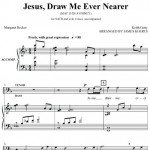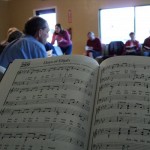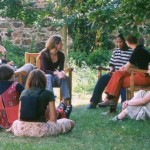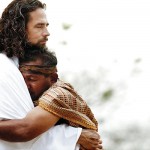Each one has a hymn: Joy to the world!
In two previous posts, I asked how singing can be edifying to the church and offered one example of how we have attempted to make singing more edifying by attaching the lyrics of the songs to our lives. (See my posts “Each one has a hymn” and “Each one has a hymn: Singing for edification.”) In another post, I explained how a brother shared how the song “Jesus draw me ever nearer” in his own life and in doing so edified the whole church. In this post, I’m going to share another example of a song that was shared in our gatherings over the last few weeks.
One Sunday morning, we were talking about one of our sisters. A few weeks earlier, she had been diagnosed with cancer again, and the doctors had only given her six months to live. She had been struggling physically… although she was and still is very strong spiritually. Someone mentioned visiting her, so I called her. It turned out that she had just woke up, and she felt strong enough for visitors.
So, we all piled in a few cars and headed over to her house where we spent the next hour or so talking, singing, praying, reading Scripture, etc. Our intention was to encourage her and her two daughter who were taking care of her. Instead, we all ended up being built up in Christ.
Now, in the past, before she learned that her cancer had returned, she had always responded to times of singing and testimony with something like this: “I always have a praise for my Lord!” This morning – in spite of the cancer and the weak body – she also wanted to share a praise with us. Then, she asked if we could sing “Joy to the World” (by Isaac Watts) together. Yes, “Joy to the World.” It’s much, much more than just a Christmas carol. So, we sang…
Joy to the World , the Lord is come!
Let earth receive her King;
Let every heart prepare Him room,
And Heaven and nature sing,
And Heaven and nature sing,
And Heaven, and Heaven, and nature sing.Joy to the World, the Savior reigns!
Let men their songs employ;
While fields and floods, rocks, hills and plains
Repeat the sounding joy,
Repeat the sounding joy,
Repeat, repeat, the sounding joy.No more let sins and sorrows grow,
Nor thorns infest the ground;
He comes to make His blessings flow
Far as the curse is found,
Far as the curse is found,
Far as, far as, the curse is found.He rules the world with truth and grace,
And makes the nations prove
The glories of His righteousness,
And wonders of His love,
And wonders of His love,
And wonders, wonders, of His love.
There’s not much more to share about this example. In spite of her physical struggles and her sickness, this sister edified us with her faith in God and her continued desire to praise him!
Each one has a hymn: Jesus draw me ever nearer
In two previous posts, I asked how singing can be edifying to the church and offered one example of how we have attempted to make singing more edifying by attaching the lyrics of the songs to our lives. (See my posts “Each one has a hymn” and “Each one has a hymn: Singing for edification.”) In the next few posts, I’m going to share some examples of songs that have been shared in our gatherings over the last few weeks.
One morning, one of our brothers asked us to sing a song by Keith Getty and Margaret Becker called “Jesus Draw Me Ever Nearer (May This Journey).” This is a fairly new hymn (from 2002), and I did not know it.
But, my friend shared that he had been struggling with trusting God lately, and this song kept coming to mind as a prayer to God during those tough times. These are the words that we sang together:
Jesus draw me ever nearer
As I labour through the storm.
You have called me to this passage,
and I’ll follow, though I’m worn.[chorus]
May this journey bring a blessing,
May I rise on wings of faith;
And at the end of my heart’s testing,
With Your likeness let me wake.Jesus guide me through the tempest;
Keep my spirit staid and sure.
When the midnight meets the morning,
Let me love You even more.Let the treasures of the trial
Form within me as I go –
And at the end of this long passage,
Let me leave them at Your throne.
Knowing that God had used this song in my brother’s life, that he had sung it personally as a prayer for God to strengthen his faith, and that he had shared it with us in order to encourage us to trust God helped us all to focus on the words as we sang them.
After we sang, and really throughout the time that we were gathered together, people continued to refer back to the words of the song and our friend’s confession that he was struggling with trusting God. In fact, other shared about their own struggles trusting God.
As we turned to Scripture, we continually saw the theme of trusting God pop up in our conversations, which again reminded us of our brother’s song request.
If he had not shared how God had used this song in his own life, the lyrics would not have been as meaningful to us as a community. Not only did we understand better about what was going on with our brother, we could also see how God was working in his life to strengthen and encourage him, then using him in the same way in our lives.
Each one has a hymn: Singing for edification
As I said in my previous post (“Each one has a hymn“), Paul said that everything we do when we gather together with other believers should be done for the purpose of building each other up. In the context of that statement (1 Corinthians 14), he specifically mentions singing a couple of times.
So, I asked the question, “When we come together with other believers and when we sing, how do we sing in a way that edifies one another?” The “one another” part of that question is very important. Throughout that chapter – and in other places – Paul specifically differentiates between activities that edify ONLY the individual and activities that edify many. When we are with other believers, our focus is not to be on edifying ourselves, but instead our focus is to be on edifying others. How does that work with singing?
In this post, I’m going to share one way of using singing (hymns and other types of songs) to edify others. Then, in the next few posts, I’ll share a few specific examples.
In the middle section of 1 Corinthians 14, Paul explains that for something to edify others, they must understand what is being said, prayed, or sung. If a person does not understand something (for various reasons) then that person is not edified by it, even if the person speaking, singing, praying, etc. is responding to the Spirit in a way that edifies himself.
For many years, we have asked people to share a song that has been on their heart. We would sing the song together, and then move on to the next song. However, we wanted this to be a more edifying time.
So, a few years ago, when someone requested that we sing a song, we started asking a simple question: “Why do you want us to sing that song?” Usually, the person explains something that has happened in the recent past (sometimes the distant past) and how that particular song corresponds with what God was doing in that instance. In that way, the song shifts from a generic lyric written by someone we don’t know into something that has meaning both to the person and now to the community.
Often, after the person requesting the song explains the significance and after we sing the song together, others will then add their own comments regarding the song and its significance to their own life. Again, the song become even less generic and becomes even more relevant to all of us, knowing more about what our friends are going through.
By the way, there are times when someone (especially our younger or more quiet friends) will request a song simply because “it is one of my favorites.” We do not discourage that at all. In fact, others will often still discuss the significance of the part of the lyrics after we sing together.
Furthermore, as we sing multiple songs and as different people discuss the significance of the lyrics, we find a connection between many (or all) of them. That connection often carries over as we discuss a particular passage of Scripture or a topic together.
In this way, singing hymns and psalms and spiritual songs becomes much less about the music and much more about what God is doing in our lives as individuals, as families, and as a community in Christ.
Do you think that discussing the significance or relevance of the lyrics would be edifying to others? Would this make this song more understandable – at least, would it make the reason for wanting to sing that particular song more understandable? Can you think of other ways to make singing hymns, psalms, and spiritual songs more edifying to the church?
Each one has a hymn
The title of this post comes from 1 Corinthians 14:26 – “What then, brothers? When you come together, each one has a hymn, a lesson, a revelation, a tongue, or an interpretation. Let all things be done for building up.” (1 Corinthians 14:26 ESV)
In this part of his letter to the church in Corinth, Paul exhorts the believers to gather together in order to edify (build up) one another. While Paul mentions several different activities such as teaching, prophesying, praying, seeing, etc., he does not explain how to carry out those various activities. Instead, he focuses on the purpose of any activity that is done while gathered with other believers: edification. In fact, the entire chapter is focused on edification.
But, have you ever thought about how hymns and singing would edify others?
We know from other passages that singing can be directed only to God. For example, consider this statement (also from Paul) about singing:
[B]e filled with the Spirit…addressing one another in psalms and hymns and spiritual songs, singing and making melody to the Lord with your heart… (Ephesians 5:18b-19 ESV)
Notice that in the statement above, Paul says that singing is one result of being filled with the Spirit. But, he lists two different kinds of singing: 1) addressing one another in psalms and hymns and spiritual songs, and 2) making melody to the Lord with your heart. So, there is a type of singing that is prompted by the Holy Spirit which is directed from the individual directly to God. But, there is another type of singing which is also prompted by the Holy Spirit which is addressed to one another.
This second type of singing is the kind that Paul is talking about in 1 Corinthians 14 and which Paul says should result in edification (building up). In fact, Paul specifically says in 1 Corinthians 14 that those activities that are specifically between the individual and God but which do not edify others should not take place when we are gathered with others.
For example, in the passages below, Paul says that we should not pray, sing, or speak in tongues (without interpretation) – among other activities – if others are not edified:
What am I to do? I will pray with my spirit, but I will pray with my mind also; I will sing praise with my spirit, but I will sing with my mind also. Otherwise, if you give thanks with your spirit, how can anyone in the position of an outsider say “Amen” to your thanksgiving when he does not know what you are saying? For you may be giving thanks well enough, but the other person is not being built up. (1 Corinthians 14:15-17 ESV)
If any speak in a tongue, let there be only two or at most three, and each in turn, and let someone interpret. But if there is no one to interpret, let each of them keep silent in church and speak to himself and to God. (1 Corinthians 14:27:28 ESV)
Paul never says that the prayer, singing, or tongue speaking are invalid or not in the Spirit. Instead, he says we should only pray, sing, or speak in tongues (among other activities) in ways that are both understandable and edifying when we are with other believers.
Thus, when we are gathered together with our brothers and sisters in Christ, our singing is to God, but it is also to one another (i.e., “addressing one another”). Similarly, our singing is for the purpose of building one another up as much as it is for the purpose of praising God.
So, when we come together with other believers and when we sing, how do we sing in a way that edifies one another?
Replay: Learning to live dependent on God and interdependent on one another
Four years ago, I wrote a post called “Interdependence.” The post was written after a weekend in which I witnessed a man who refused to admit that he needed help and refused to accept help when it was offered (although it was clear that he did need help). That same weekend, I witnessed a friend admit that she needed help and other friends offer help. It reminded me that we are both dependent on God, and interdependent upon one another – as God often works through his children to help one another.
I hope this post is as encouraging to you as the actual experiences were to me.
———————————–
Interdependence
As followers of Jesus Christ, we are both dependent upon God, and interdependent upon one another. Unfortunately, society teaches us to be independent – neither dependent nor interdependent. We’re taught to learn for ourselves, fend for ourselves, care for ourselves, earn for ourselves, and do for ourselves. We’re taught not to admit that we need help from anyone nor to accept help from anyone. This is the nature of American society, but it is not the nature of the follower of Jesus Christ – he or she has a new nature.
This point was driven home for me last Friday. Our family arrived at the event location for the North Raleigh / Wake Forest Relay for Life around 5:15 p.m. We were supposed to drop off our canopy, chairs, tables, etc. – which we did. The committee was supposed to pick up our stuff and take it to our site – which they did. I was supposed to park my vehicle – which I did – while my family walked to our site – which they did. Everything was going according to plan.
Except… as soon as I parked our van, it started to rain. It wasn’t a slow sprinkle, it was a gully-washer – at least, that’s what we called it in Alabama. The entire time that I was walking – running – to our event site, I could picture my family standing in the middle of a muddy field getting drenched by the rain. Imagine my surprise when I reached our site to find that two teenagers from a nearby site had come to their rescue! The two young men were helping my wife set up the canopy, and they had pulled all of our equipment under the canopy. Those two teenagers were my heroes that night! After I arrived, I helped them finish setting up the canopy, and we stayed as dry as we could while the rain continued.
Not long after our canopy was set up, another team arrived at the site next to ours. The team – at this time – consisted of a mother, her teenage daughter, and two or three more teenage girls. My family helped them spread their canopy over their stuff. We offered to help them raise their canopy, but they said they didn’t want to raise it yet. Instead, they stood under some umbrellas and waited for the husband to arrive.
When the husband arrived, I again went over and offered assistance. I told him that some boys from a neighboring site had helped us, and that we would love to help them set up their canopies – they actually had two. He said no. He didn’t need the help, but thank you anyway.
We watched and listened as he struggled to raise the canopy in the wind and rain. He was obviously getting frustrated because his family was not doing things the way he thought they should be done. They often spoke loudly – shouted – at one another as they tried to raise the two canopies and keep their stuff dry at the same time.
When the shouting had subsided for a moment, and when tempers seems to settle a little, I again walked over and asked if I could help. He said… and I quote… “No, we like to fight while we do this.” I told him that I would be glad to help, if he decided he needed anything. Then, I walked back to my canopy.
As I think back over this encounter, I recognize the church acting in this stubborn, independent manner many times. It seems that even believers have the attitude that they can do everything by themselves and they don’t need any one’s help. It often appears that many feel that asking for help or accepting help from others is a sign of weakness or spiritual immaturity.
This is such a travesty and a misunderstanding of what it means to be brothers and sisters in Christ. God provides us with relationships with one another so that we can love one another, accept one another, help one another, give to one another, and serve one another. We cannot make it through this life alone – at least, we cannot live the way God wants us to live alone. We need God, and we also need one another. Independence may be an American virtue, but it is a Christian vice.
The next day, Saturday, my family was helping one our young, single, female friends move. (I mentioned this briefly in my post called “Weekend of Service“.) A few weeks before, this young lady began telling people that she needed help finding a place to live. Another family asked if she would like to live with them. They shuffled their boys’ bedrooms so that our friend could have a room to herself, and Saturday afternoon, a bunch of us got together, packed up her belongings, and moved her into their house.
After unloading all of the boxes, another friend brought dinner for everyone. While I was sitting there enjoying a homemade meatball sub, I remembered the encounter with the man who refused to acknowledge that he needed help, and refused to accept help when it was offered. What a stark contrast to my friends, one of whom acknowledged that she needed help and accepted the help that was offered, and a family who was willing to put their own comforts aside and offer help.
This is a beautiful picture of God’s family. Brothers and sisters recognizing their complete dependence upon God and willing to live interdependent upon one another. That evening, I couldn’t help but thank them and praise God for the example of community that he had shown me that day.
Equipped by Itinerant Servants of God
One of my favorite passages of Scripture is Ephesians 4:7-16. After focusing on our unity in Christ in Ephesians 4:1-6, Paul turns to the great diversity among the body of Christ – all worked out by the Holy Spirit according to the grace of God.
But, as he comes to the end of that passage (Ephesians 4:16), Paul stresses that the diversity is not simply a demonstration of the myriad grace of God, it is also through all of the different (diverse) parts of the body of Christ that the Spirit works to build us all up – when we are all working together as God directs us and provides for us.
In Ephesians 4:11, Paul focuses on a few of the ways that God works through his children: as apostles, prophets, evangelists, and pastors and teachers. These people who have been gifted by the Holy Spirit and given by Jesus Christ equip the church for works of service. The evangelist, then, proclaims the gospel of Jesus Christ, but also equips other believers to do the work of service of proclaiming the gospel, even those who are not gifted as evangelists. Those gifted at teaching and shepherding not only teach and shepherd others, they also equip other believers to do the work of service of teaching and shepherding as well.
But, what about the apostle? How does the apostle equip the church? Usually, I’ve heard it suggested that apostles equip the body of Christ by proclaiming the gospel, revealing the word of God, and teaching and shepherding. But, these are actually including in the work of the evangelist, the prophet, and the teacher and shepherd. What is distinctive enough about those gifted as apostles that would cause Paul to list them separately?
There is one distinction of those gifted as apostles: they are specifically gifted to travel from place to place serving God. In other words, while they may do many other things, the gifting of apostle is primarily to do the work of the itinerant servant.
So, how does the apostle – the itinerant servant of God – given to the body of Christ by Jesus to equip the church – actually equip the church as Paul instructs in Ephesians 4:12-13? What is the work of service that the apostles equip others to do?
Just as the evangelist equips others to evangelize, and the teacher equips others to teach, the itinerant servant (apostle) equips others to travel from place to place just as the itinerant servant does. I think we see a beautiful picture of how this kind of equipping (to be itinerant servants) worked itself out in the life of some believers in this passage:
And you became imitators of us and of the Lord, for you received the word in much affliction, with the joy of the Holy Spirit, so that you became an example to all the believers in Macedonia and in Achaia. For not only has the word of the Lord sounded forth from you in Macedonia and Achaia, but your faith in God has gone forth everywhere, so that we need not say anything. (1 Thessalonians 1:6-8 ESV)
While the believers in Thessalonica (a city where Paul only stayed a few weeks) did not travel as far and as wide and as often as Paul and others gifted as apostles, they did travel enough to proclaim the word of God around their region and into neighboring regions. Paul – gifted as an apostle to travel from place to place as an itinerant servant of God – had equipped them (even in a short period of time) such that they were also traveling from place to place to proclaim the word of God.
How could you see itinerant servants working today to equip the body of Christ? What are some ways that others (not gifted as itinerant servants) could serve when equipped by itinerant servants?
————————–
Addendum: Yesterday, on Facebook and Twitter, I linked to an older post that I wrote about itinerant servants. Several new comments were pertinent to this post, so I thought I would include a couple of excerpts here:
Eric writes: What I should have said is, “I would call those people ‘Christians’ or ‘Christ Followers.’ In one way or another I think it is what we’re all called to do and by making a distinction dismisses it to the role of a few.
Mark writes: Eric suggests that Christians should be itinerant in general, and I absolutely agree, but I hesitate to make that an absolute. I’m guessing there are many Christians around the world who never leave their village/town, and certainly the duration that someone feels led to stay/go will vary widely. But I think Eric brings up a great point that in general, Christians should be less tied to some tangible thing (house/job/preference) and be more tied to the leading of the Spirit, wherever and to whomever that might lead.
Greg writes: Looking over 2 millenia of the church, we also have a really messy macro trajectory, with very little scripture to back up anything we have done or built. And yet, histories pages are filled with the love and leading of Gods people, and His blessing on all of us.
And today, I’m genuinely jealous of my children who I suspect are going to see the glory of God like few generations in history.
Itinerant indeed!
God is really among you
If you’ve followed my blog for even a short time, you probably know that Eric at “A Pilgrim’s Progress” is a good friend of mine. We’ve known each other for almost 10 years and have spent time with one another’s family – although not enough in the last few years because we live in different states (and different countries for a while).
Like me, Eric’s understanding of the church has changed since we’ve known each other, even though we’ve taken different paths along the way. One thing that we’re both convinced of (currently) is the benefit of conversation and discussion among the church. His latest post, “Awe in the Conversation,” touches on one aspect of the idea of teaching one another through discussion.
Here’s one snippet from his post:
I love hearing from multiple people about how they have seen God act during the previous week. Usually it is in the little things. Occasionally, it is the bigger stuff. Either way, my faith is strengthened through it. My hope is that others are encouraged as I speak. Sometimes we all just sit in silence after someone has spoken of what God has done and is doing.
This sort of gathering finds awe in the conversation. Someone might speak about a passage of scripture from an angle that I have never even considered before. When a light bulb comes on in my brain, the response is usually awe of God and thanks to Him. Someone else might speak about being stuck in a situation where there seems to be no way out (whether it be big, small, or somewhere in between), only to then find God delivering them from it.
As we gather, I’m usually sitting on the floor or on a couch. Literally, then, I’m sitting. Emotionally and spiritually, however, I’m standing. I’m standing in awe of God because of what I’ve heard in the conversation.
When I read Eric’s post, I couldn’t help but think of what Paul wrote in 1 Corinthians 14:
If, therefore, the whole church comes together and all speak in tongues, and outsiders or unbelievers enter, will they not say that you are out of your minds? But if all prophesy, and an unbeliever or outsider enters, he is convicted by all, he is called to account by all, the secrets of his heart are disclosed, and so, falling on his face, he will worship God and declare that God is really among you. (1 Corinthians 14:23-25 ESV)
Obviously, in that passage, Paul is comparing the benefit of tongues speaking (which people cannot understand) to the benefit of prophecy (which people can understand). But, his last point is important: The unbeliever recognizes that God is among them because he hears from God through different people.
Oh, yes. There is definitely “awe in the conversation” when our hearts are focused on God together and we seek to build one another up together.
Guest Blogger: Man-made aspects of religion were coming back to haunt me
I’ve invited several people to write “guest blog posts” for this blog. There are several reasons for this: 1) To offer different perspectives. 2) To generate even more discussion and conversation between blogs. 3) To introduce other bloggers to my readers.
(If you are interested in writing a guest blog post, please contact me at aknox[at]sebts[dot]com.)
Today’s post was written by Surit Dasgupta. I think Surit is the first person from India to write a guest post for me. You can connect with Surit via his blog “Christ Our Lord.”
——————————————-
When I was twelve years old my dad brought me a very special gift on my birthday. It was a book called “Stories from the Bible – The New Testament”. I was fond of heroes, heroes who would triumph over evil against all odds, heroes who would protect the weak and the oppressed. I saw so many of these mythological characters in Hindu scriptures, there were warriors, lovers, and damsels in distresses. But when I finished reading about Jesus Christ I knew I had found the greatest Hero among all. I wanted to become a follower of Christ and there was nothing that was going to stop me from doing it.
As a Hindu, I was accustomed to rituals and clergy. The priest, better known as ‘pundit’ in Hinduism, would never allow a common man like me to touch the ‘deity’. I laughed at the pundit in my mind. I had a special secret – Jesus Christ. He was my guru and no one else. The rest were all man-made. Little did I know that these man-made aspects of religion were coming back to haunt me in my Christian life. I tried to find out what they were but I realized that they were all around me.
On Sunday meetings, the system in our local church was mechanized and very institutional. There was a ‘presider’ and he alone would determine who participate in the ‘service’. There was a preacher who would bring the ‘sermon’ which usually lasted 40-50 minutes. There was a strict almost classroom-like discipline which bounded the entire congregation. But there was something lacking and I knew it. The freedom to express Christ at will was non-existent. There were a couple of elderly members who were virtually sitting through the entire service (except that they had to ‘stand-up’ for the communion). These members had no-one to speak for them. There were disguised threats thrown by pulpit-armed preacher (I was a part of it) at members he didn’t like. No one dared say anything when the sermon was being delivered. And the most horrifying thing was that Christ was choke-holded into being a Spectator as well. It was Hinduism all over again!
It was at this point that someone gave me Frank Viola’s “Pagan Christianity?” to read. You can probably guess what happened afterward. I and a couple of other Christians protested against this mechanical institutionalism practiced by the local church leaders. We were ordered to ‘hush up’ and refrain from teaching our ‘false doctrine’. All we wanted was that everyone have the freedom to speak at will in the assembly.
One congregation considered our plea. There was an American missionary in that congregation and he wanted to hear us out. We moved to that congregation and were allowed to have an open-participatory meeting on Sunday. Everyone, except the missionary, was puzzled at what we were trying to achieve. Once that meeting began it all looked so very similar except that all of a sudden everyone had the freedom to choose their songs. There were people who said nothing in the usual Sunday ‘services’. These people were suddenly starting to ‘open’ their lips and say words of encouragement. People started to pray at random for one another. There was laughter… laughter at a Sunday meeting! It was surreal! It was so unlike an institutional church. It was like… like a family.
My mind now traces back to those first traces of Jesus in my childhood memory. He was the ultimate Hero – One who is the Protector of the weak and oppressed. Now He has a family – the church.
Replay: Meeting Around the Table of the Lord
Two years ago, I wrote a post called “Meeting Around the Table of the Lord.” The described our church gathering on Easter morning, when we gathered together “to break bread.” The Lord’s Supper was not a piece a bread and sip of juice tacked on the end of our meeting. Instead, our meeting was centered on sharing a meal together.
Here is the post:
——————————————
Meeting Around the Table of the Lord
I’ve written several times on this blog about the Lord’s Supper, or Communion, or the Eucharist, or whatever you want to call it. I’ve talked about how the Lord’s Supper is described as a meal in Scripture. I’ve also written about how we usually eat together when we gather with the church.
Still, though, there has usually been a disconnect between our meeting together, the bread/cup, and eating a meal together. I’ve often thought about how this disconnect could be remedied.
Last Sunday – yes, Easter Sunday – we had an opportunity to meet in a different way that brought together the bread/cup, a meal, and our whole meeting.
We began by meeting around tables. People knew that we would be eating together, so they brought food with them – rows of crock-pots, casseroles, dishes, and other assorted goodies. We then milled around and talked and discussed our week and different things like that.
Eventually, one of our brothers started leading us in some singing. Since it was Easter, and since we were planning to study the resurrection passage in Matthew 28:1-17, we sang several songs about the resurrection. We’re also reading through Acts together, so at one point two brothers read from Acts 18, one reading the first half of the chapter, and another reading the second half of the chapter.
After a few songs, we talked about the significance of the bread and breaking the bread. We talked about how the bread signified both Jesus’ broken body as a sacrifice on our behalf, and how the broken bread signifies the beginning of our meal with Jesus as our risen, living host. It remains his table, not ours.
Since I was planning to lead our discussion of Matthew 28:1-17 that morning, I suggested several questions that people could discuss together around their tables as they were eating.
Then, after we broke and shared the loaf of bread together, we began eating. As we ate, we discussed the questions that I suggested. After most people had finished eating, and while a few were finishing dessert, I asked each table (we had five tables) to share something about their discussion.
Next, I read and led a discussion of Matthew 28:1-17. Of course, our discussion around the table led into this teaching/discussion. Since people had already been talking about the issues in smaller groups, it seemed our larger group discussion was even more open and focused on the topic.
Finally, after a few announcements, we passed around the “cup” (actually a bottle of grape juice) and shared this together.
There are many ways for the church to meet together. I really appreciated the way we met together last Sunday. I liked the way that our meeting format combined the bread, cup, meal, and teaching all together in a unified format. The bread/cup and meal were not “tacked on” to the meeting, but were an integral part of our meeting together.
Are you resting in the presence of Jesus Christ each moment?
In the last couple of weeks, I’ve had something wonderful happen a few times – two that stand out. Each time, I was talking with someone who was struggling with relational or emotional issues. And, each time, the other person ended up encouraging me in Jesus Christ.
But, then, this is the way the Holy Spirit works through his children if we recognize that we are in mutual discipling relationships – that is, that we are helping one another walk in Jesus Christ. As I was growing up, I learned that discipling relationship were more unidirectional. Whether this was taught intentionally or caught by example, I don’t really know – although I could probably point to both options in my life.
While mutual discipleship would be a good topic for a blog post, that’s not the reason that I’m writing this post. However, it’s important to recognize that when I’m talking with someone, I’m not just wondering how I can help them follow Jesus. I’m always looking for mutual discipleship, knowing that Jesus could use anyone to help me follow him better.
In the two examples that I’ve been thinking about, two men were struggling. And, even though I was hoping to help them and encourage them in the midst of those struggles, I also recognized that these were brothers in Christ who were strong in the faith and who God has used previously to encourage and challenge me.
As we talked about trusting God through the circumstances of our lives – different circumstances, but the same need to trust God – they both asked me about my own life. That alone demonstrates the character and concern of these two brothers. Although they were struggling themselves, they also cared about me. They listened intently as I shared a few things, and they both asked me the same question (although perhaps phrasing it a little differently): Are you resting in the presence of Jesus Christ each moment?
I love that they asked me this! Seriously!
A few years ago, in different contexts, I would have expected Christians to ask me questions like these: “Are you having your daily quiet time?” “Are you reading the Bible every day?” “Are you faithfully attending church activities?”
Now, these can be good things, but they are – at best – means or methods that could possibly lead to the end that we should be seeking: resting each moment in the presence of Jesus Christ. This can also be stated as abiding in Jesus, or walking in the Spirit. But, the point is the same: For those of us who are in Christ, God is always with us through his Spirit. We do not have to conjure him or catch his attention. Instead, we must simply live in his power and presence instead of living by our own devices and plans.
My two friends had learned that while various activities (sometimes referred to as “spiritual disciplines”) might help me focus on Jesus Christ, the activities themselves are not the goal. And, asking about carrying out the activities could simply produce a feeling of false security. I can check off activities like praying or reading Scripture or attending church gatherings, but they do not mean that I am actually abiding in Christ.
So, are you resting in the presence of Jesus Christ each moment? Are you abiding in Christ and living in his power?










